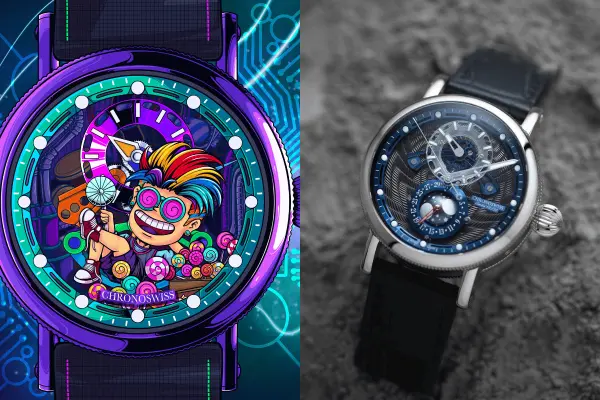- In a world where timeless elegance collides with the cutting-edge technology of the metaverse, luxury watches are boldly stepping into the digital frontier.
- As the digital revolution transforms industries, these exquisite timepieces are embracing innovation like never before, seamlessly blending traditional craftsmanship with futuristic possibilities.
- Step into a realm where sophistication meets virtual reality, as we explore how luxury watches are redefining timekeeping in the age of the metaverse.
In a world where timeless elegance collides with the cutting-edge technology of the metaverse, luxury watches are boldly stepping into the digital frontier. As the digital revolution transforms industries, these exquisite timepieces are embracing innovation like never before, seamlessly blending traditional craftsmanship with futuristic possibilities. Step into a realm where sophistication meets virtual reality, as we explore how luxury watches are redefining timekeeping in the age of the metaverse.
Time to adapt to a digital future

The metaverse, an all-encompassing space for digital experiences that enables multiple virtual worlds to coexist and interact, is gaining significant attention for its potential and rewards . The fashion industry, especially the luxury sector, has taken notice of this trend and is embracing digital technologies to build an interconnected shopping experience .
In 2023, Forbes reported that the metaverse presents an opportunity for luxury brands to create a continuum of immersive digital experiences across various platforms. The metaverse fuses reality and fantasy: Users can interact with each other, objects, and places seamlessly and in real-time, bringing to life a fantastical alternate reality that can be easily manipulated .
Luxury brands are experimenting with metaverse technologies to create a continuum of immersive digital experiences across various platforms. In February 2023, Tiffany & Co. launched its own non-fungible token, called NFTiff, which offers 250 CryptoPunk holders the chance to buy a custom pendant with the image of their Punk.Gucci collaborated with Roblox to create a virtual clothing capsule collection, and in 2021, one of the brand’s digital handbags sold for over $4,000 —more than it cost in the real world.
According to Arabian Business, the metaverse could give luxury brands the power to easily carry out trend-checks, evaluate production quantities, and understand whether they need to manufacture or revive specific products based on virtual demands . This provides brands with the possibility to gather customer feedback and therefore plan for the future.
In November 2021, Morgan Stanley predicted that NFTs (non-fungible tokens) and social gaming could expand the luxury group’s total addressable market by more than 10% in eight years time and boost industry earnings before interest and tax by around 25% .
Also read: Samsung introduces diet platform: Samsung food
Luxury watches in the metaverse

Digital luxury watches are designed and presented in virtual spaces to cater to the growing demand for digital luxury goods. The virtual luxury space has become a lucrative area for brands, creators, and tech companies, thanks to the advancement of blockchain technology and the growing popularity of cryptocurrencies and non-fungible tokens (NFT) .
The virtual luxury space is being expanded with major brands jumping on the digital bandwagon. High-end brands are expanding their presence in the virtual luxury space by creating products for the virtual luxury marketplace, which also gains them presence in a new marketing space .
Jacob & Co., renowned for its timepieces that blend watchmaking and fine jewelry, is now setting its sights on the virtual world. The brand is introducing its first NFT luxury watch, which will be auctioned on the ArtGrails NFT platform on 4 April.
Also read: How AI and Machine Learning revolutionised the beauty industry
Virtual experiences and events

Luxury watch brands are leveraging the metaverse for virtual events and product launches to cater to the growing demand for digital luxury goods. The virtual luxury space has become a lucrative area for brands, creators, and tech companies, thanks to the advancement of blockchain technology and the growing popularity of cryptocurrencies and non-fungible tokens (NFT) .
Virtual showrooms and interactive experiences offer several advantages to consumers. Here are some of them:
1. No time restrictions: Virtual showrooms are not restricted by time, unlike physical showrooms. Consumers can visit the virtual showroom at any time that is convenient for them .
2. Product visualization: Virtual showrooms provide a flexible space to display products. Unlike 2D images, which only provide a shallow representation of a product, a virtual showroom allows for full 360 examination of a product in its environment. This gives customers in-depth knowledge of how the product looks and feels, without relying on confusing product descriptions.
3. No distance limitations: Customers can visit virtual showrooms from anywhere in the world, without being limited by distance, inventory, or opening hours .
4. Cost-effective: Virtual showrooms are cost-effective compared to physical showrooms. Brands can save money on rent, utilities, and other expenses associated with maintaining a physical showroom.
5. Customer support: Virtual showrooms provide customer support through chatbots, virtual assistants, and other interactive features. Customers can get their queries resolved in real-time.
6. Analytics: Virtual showrooms provide valuable analytics data to brands. Brands can track customer behavior, preferences, and interests, and use this data to improve their products and services.
7. Increases user convenience: Virtual showrooms offer immersive product buying experiences from the comfort of customers’ homes, eliminating the need to travel and offering convenience and immediacy.
Also read: Generative AI apocalypse? Relax, it’s more hype than reality
Challenges and considerations

The metaverse is a new and rapidly evolving space, and as such, there are several challenges related to authenticity, privacy, and security. Here are some of the challenges:
1. Authenticity: The authenticity of digital luxury watches is a concern for consumers. Unlike physical luxury watches, which can be authenticated by experts, digital luxury watches are difficult to authenticate. This makes it easier for counterfeiters to create fake digital luxury watches.
2. Privacy: Privacy is a major concern in the metaverse. Virtual worlds collect vast amounts of data about users, including their personal information, preferences, and behavior. This data can be used to create detailed profiles of users, which can be used for targeted advertising or other purposes. Consumers are concerned about how their data is being collected, stored, and used.
3. Security: Security is another major concern in the metaverse. Virtual worlds are vulnerable to hacking, phishing, and other cyber attacks. Consumers are concerned about the security of their personal information, including their financial information.
In conclusion, the metaverse presents several challenges related to authenticity, privacy, and security. Consumers are concerned about the authenticity of digital luxury watches, as well as their value, ownership, and durability. Brands and creators need to address these concerns to build trust with consumers and ensure the long-term success of digital luxury watches.
Also read: South Korean President Yoon Suk Yeol and Japan’s Fumio Kishida set for tech cooperation roundtable
Market trends and future prospects
The metaverse is a rapidly growing space, and the luxury watch industry is leveraging it to cater to the growing demand for digital luxury goods. According to a report by Grand View Research, the global metaverse market size was estimated at USD 65.5 billion in 2022 and is expected to grow at a compound annual growth rate (CAGR) of 41.6% from 2023 to 2030.
Luxury watch brands are using the metaverse for virtual events and product launches to expand their presence in the virtual luxury space. Virtual showrooms and interactive experiences offer several advantages to consumers, including no time restrictions, product visualization, no distance limitations, cost-effectiveness, customer support, analytics, and increased user convenience.
However, there are several challenges related to authenticity, privacy, and security in the metaverse. Consumers are concerned about the authenticity of digital luxury watches, as well as their value, ownership, and durability. Brands and creators need to address these concerns to build trust with consumers and ensure the long-term success of digital luxury watches.

